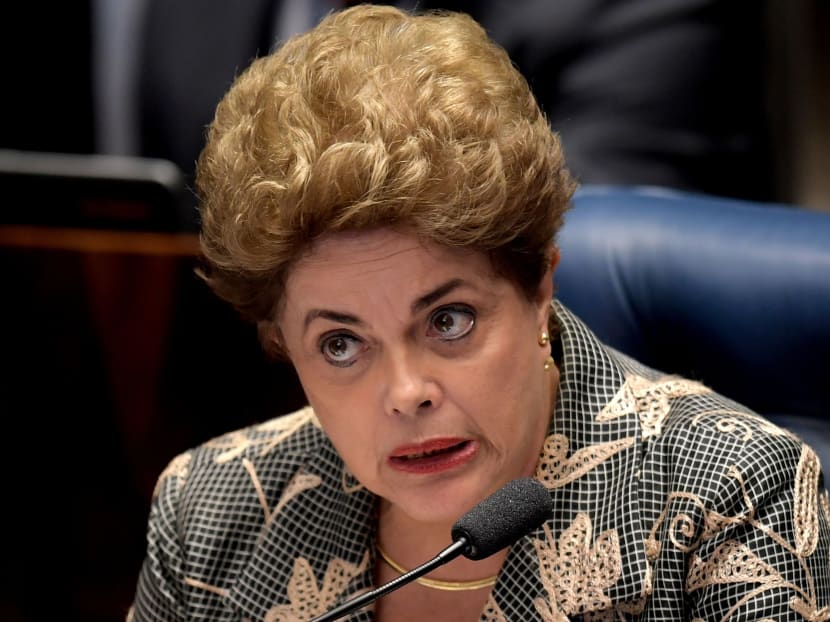Brazil's evangelicals pray for sinful politicians
BRASILIA (Brazil) — If pastor Francisco Carlos Soares de Menezes’s prayers are answered, Ms Dilma Rousseff would not be the last Brazilian leader sent to the political hellfires.

Suspended Brazilian President Dilma Rousseff gestures during her testimony in her impeachment trial at the National Congress in Brasilia, Aug 29, 2016. Photo: AFP
BRASILIA (Brazil) — If pastor Francisco Carlos Soares de Menezes’s prayers are answered, Ms Dilma Rousseff would not be the last Brazilian leader sent to the political hellfires.
The 68-year-old suspended president appears set to be stripped of office when the Senate votes, starting on Tuesday (Aug 30), on whether she is guilty of fiddling the nation’s accounts and taking unauthorised loans.
Many of those attacking Ms Rousseff, however, are themselves accused in criminal cases ranging from embezzlement to vote buying and bribery.
Mr De Menzes, a pastor at Memorial Baptist Church, part of a rapidly growing evangelical Christian movement in Brazil, says sadly that sin has been around “since mankind turned from God”.
But now Brazil’s current political turmoil, he says, is a sign that God is bringing change.
Mr De Menzes, 57, points to a vast anti-corruption probe called Operation Car Wash that has led to prosecutions and convictions of some of Brazil’s most powerful men over the last year.
“God is acting,” he said at the sprawling church complex in the capital Brasilia. “We believe that many of the things that are happening are the answers to our prayers.”
RISING POWER
While Brazil is still a majority Roman Catholic country, religious and political momentum is increasingly with the upstart evangelical Christians, who now account for almost a quarter of the population.
The evangelical churches — such as the Assembly of God and the Universal Church, which are both led by multi-millionaire pastor-tycoons — are rapidly gathering souls and influence.
In the 2014 elections, evangelical candidates not only gained a record number of seats but a Pentecostal environmentalist, Ms Marina Silva, came close to winning the presidency from Ms Rouseff.
And now Congress’s evangelical block is exercising its clout to chastise Ms Rousseff — formally on trial for illegal budget manipulations, but essentially being blamed for Brazil’s dire economy.
The block threw its weight behind impeachment in April, citing “the grave economic, moral, ethical and political crisis across Brazil”.
HAVENS
In Brasilia, a capital city renowned for political back stabbing and corruption, the Memorial Baptist Church could be seen as a sanctuary of goodness.
From one building come the soaring voices of adults at choir practice. In another, children are learning about the Bible.
Small groups of young people sit in circles on the grass or steps of the church playing guitar or discussing religion. Everyone smiles.
“I want to thank God for my good exam results,” a teenager can be heard telling friends in a soft voice.
Adherents of the evangelical brand around Brazil praise its social activism and ability to rescue people from violence and crime.
Evangelical churches, like the US$300 million (S$408 million) replica of Jerusalem’s ancient Temple of Solomon in Sao Paulo, are often lavish affairs.
With its mirrored walls and security gates, one suburban church in Brasilia looked more like an insurance company or medical centre.
But in poorer neighbourhoods, including in the often ignored favela communities of Brazil, small, scrappy evangelical churches are havens from drug pushers and gangs.
“The more we can get people away from drugs and put them on a good path, the better,” said Mr Antonio Mendes de Lima, 42, who works as a cleaner at a Seventh Day Adventists church in the capital.
Like the evangelists, that denomination promotes strict social rules and missionary work.
WHO’S THE SINNER?
But money and politics are dragging the evangelicals into sins of their own.
Mr Eduardo Cunha, who as speaker of the lower house was instrumental in getting the impeachment process started against Ms Rousseff, made a name as a host of an evangelical radio station and he peppers speeches with religious references.
Now Mr Cunha has been stripped of his speaker’s post and is fighting to hold on to his seat in the face of corruption charges.
He is alleged to have hidden millions of dollars in bribes in Switzerland and enjoyed lavish vacations, shopping sprees and a fleet of luxury cars.
Another prominent pro-impeachment figure tarnished by bribery allegations is conservative senator, preacher and gospel singer Magno Malta.
Mr Jair Perreira, a second pastor at the Memorial Baptist Church in Brasilia, says the mess in Congress leaves him with little faith in politics — or Ms Rousseff’s impeachment.
“The whole political class is in danger,” Mr Perreira, 44, said.
Asked if any politician could save Brazil’s soul, he laughed: “No way!” AFP






